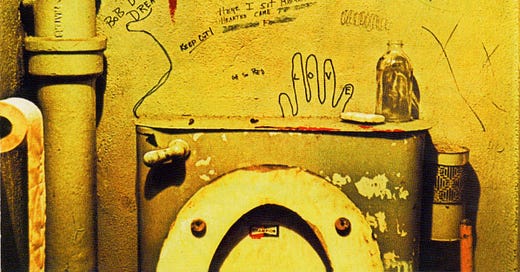Raise your glass to the hard working people
The Rolling Stones - 'Salt of The Earth' (Beggars Banquet - 1968)
It is one of the curiosities of the Acclaimed Music list of Top 100 albums that so quickly after covering The Rolling Stones’ 1969 album Let It Bleed; we are not looking at their 1968 effort, Beggars Banquet.1 We can work with that, though, as there is a school of thought the ‘Salt of The Earth’ puts in some groundwork for ‘You Can’t Always Get What You Want’ six months before the latter was recorded.
Brian Jones was starting to pull back from the band at this point in the band's history. While he would contribute to Let It Bleed, there are two tracks on this album he doesn’t play on at all - the last two. As the band moved away from the psychedelia that was evident on Between the Buttons and Their Satanic Majesties Request, they re-embraced more of their blues background and also the burgeoning roots revival that Bob Dylan and The Band were exploring and would eventually bend a whole branch of rock music, including Neil Young, Creedence Clearwater Revival and even The Beatles with their Get Back sessions in that direction.
With Jones contributing less, Keith Richards picked up some of the slack, with producer Jimmy Miller describing him as a ‘real workhorse’ in the sessions and allowing the band to keep some of the South Asian instrumentation such as sitars, tablas and tanpuras that pushed them into psychedelia in the first place. There was also a liberal sprinkling of claves and conga rhythms.
The album was well received as a return to form and a leap forward for the band. A lot was going on in 1968, and the Rolling Stones did a better job than many of reflecting that in their music.
‘Salt of the Earth’ is only the second song in the Rolling Stones catalogue - to that point, after ‘Something Happened to Me Yesterday’ that had a lead vocal from Richards. In the second verse, Mick Jagger sings, and there’s a contrast between Richard’s rough and unpolished vocal before Jagger’s familiar cocksure purring returns.
Jagger allegedly took a leaf out of John Lennon’s book and wanted to write a song for the working classes.2 I think that the song undercuts itself by taking a step away from the working class and observing them as one would do in a petri dish "(“They don’t look real to me”).
I’m sure that most of you will recognise that the salt of the earth is a biblical reference for your average Joe Bloggs that is derived from Matthew 5:13:
Ye are the salt of the earth: but if the salt have lost his savour, wherewith shall it be salted? It is thenceforth good for nothing, but to be cast out, and to be trodden under foot of men.
The rest of the song variously laments the unpaid work done by women and children - assumedly housework and caring for relatives. There’s also a reference to a lower preference for voting especially when compared to how popular “strange beauty shows” are with that demographic. It does sound rather contemporary despite approaching 55 years old. Only Jagger singing of two thousand million (2 billion) working class dates the song to the late 60s.
Musically, the song does lay down some foundations for ‘You Can’t Always Get What You Want’ Nicky Hopkins lays out a grandiose outro with Hammond organ. The Los Angeles Watts Street Gospel Choir adds soul and a tinge of gospel to the song’s ending in the same way that the London Bach Choir does to the song’s spiritual follow up on the following album. In his 1969 Jazz & Pop Ballot, dean of US rock critics, Robert Christgau, not only slotted in Beggars Banquet to his top three albums of the year3 but nominated ‘Salt of The Earth’ as his best pop song of the year.
The song is rarely played live, once in 1968, three times in 1989 on the Steel Wheels tour and once in 2002. The song has been brought out on special occasions4 away from touring. Jagger and Richards played it at the Concert for New York City in the aftermath of 9/11. The line about raising your glass to the good and the evil was amended to just doing so for good and not the evil5.
Next week: The Who and Talking Heads
No apostrophe, don’t shoot the messenger!
I can think of songs like Working Class Hero from Lennon’s solo career, but I’m struggling to think of something that could be described as a working class anthem in The Beatles’ output by mid-1968. Any ideas - please comment below!
Joan Baez covered it at an Occupy Wall St. protest to signify her solidarity with the 99 per cent.
This is because you do not, under any circumstances, "gotta hand it to them"






Great analysis. I gotta say, I've always chafed a bit against this song, precisely because of that "petri dish" element you point out. Even when they made this, Mick and Keith were part of the upper crust by virtue of their money and fame. I'm sure they were thinking back to their roots and how hard they had it especially as a band starting out, but it doesn't really play out as empathy, more as sympathy.